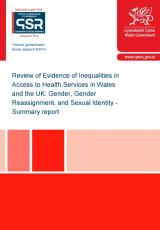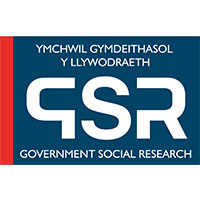The review is based only on published evidence for inequalities in Wales and the UK and does not review current practice.
This is not the latest release in the series: Review of evidence of inequalities in access to health services in Wales
Series information:
Main findings
- There is more research that relates to inequalities of access to primary care services compared to other areas.
- Although consultation rates differ for women and men in the UK, with women being more likely than men to access their GP or practice nurse, evidence suggests that there are only minor differences in their preferences in how to access or book GP surgery services.
- Lesbian, Gay or Bisexual people have less confidence in their GPs than Straight people and report poorer experiences of consultations.
- When consulting LGB people, health professionals can sometimes make inappropriate assumptions about their patient’s health needs based on their sexual identity.
- Women from BME backgrounds are more likely to book late for antenatal care and language barriers among some groups may impede understanding of health advice.
- For young men, it has been suggested that opening hours of GUM clinics and reliance on public transport may pose a barrier to accessing sexual health services, along with peer pressure and concerns about confidentiality.
- LGB people report that health professionals sometimes make inappropriate assumptions about their sexual health needs and that sexual health risks for LGB people are not fully understood by all health professionals.
- Men are generally more positive than women about their experience of cancer treatment: especially regarding staff attitudes, privacy, provision of sufficient information and being treated with dignity and respect.
- We are not able to estimate the number of people who identify as ‘Trans’ or the number of people who may wish to undergo gender reassignment but who have not yet begun the process.
- Some people experience difficulties in getting GPs to refer them for gender reassignment services and some GPs are not fully informed about gender reassignment processes or refuse treatment.
- LGB and Trans people who have mental health difficulties are more likely to report that they have felt uncomfortable using mainstream services and a majority report experiences of negative interactions within this setting. Almost a third of Trans people who have used mental health services report feeling that their gender identity was not seen as valid but as a symptom of mental ill-health.
Main recommendations
- Similar reviews of evidence for the remaining protected characteristics should be undertaken.
- Undertake research to identify interventions already being implemented and identifying case studies of good practice in Wales.
Reports

Review of evidence of inequalities in access to health services in Wales: gender, gender reassignment and sexual identity , file type: PDF, file size: 1 MB
PDF
1 MB
If you need a more accessible version of this document please email digital@gov.wales. Please tell us the format you need. If you use assistive technology please tell us what this is.

Review of evidence of inequalities in access to health services in Wales: gender, gender reassignment and sexual identity - Summary , file type: PDF, file size: 474 KB
PDF
474 KB
If you need a more accessible version of this document please email digital@gov.wales. Please tell us the format you need. If you use assistive technology please tell us what this is.
Contact
Janine Hale
Telephone: 0300 025 6539
Rydym yn croesawu galwadau yn Gymraeg / We welcome calls in Welsh.

